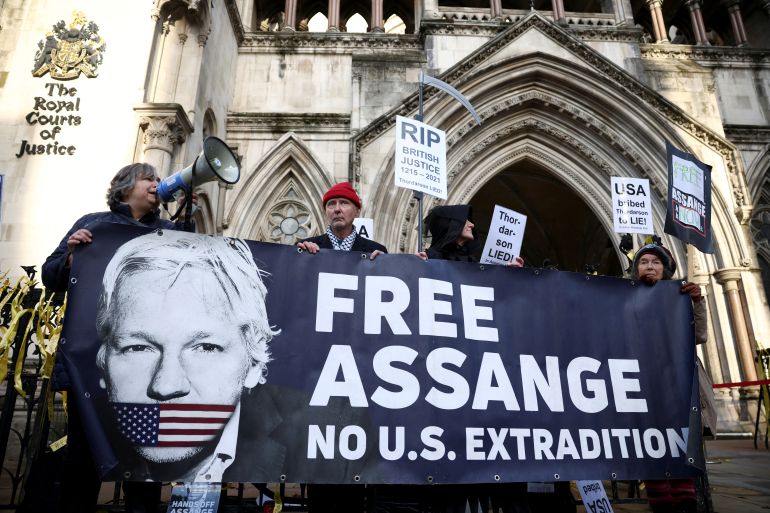The forever war on Julian Assange
America’s relentless persecution of the WikiLeaks founder is threatening the freedom of thought globally.

Imagine, for a moment, that the government of Cuba was demanding the extradition of an Australian publisher in the United Kingdom for exposing Cuban military crimes. Imagine that these crimes had included a 2007 massacre by helicopter-borne Cuban soldiers of a dozen Iraqi civilians, among them two journalists for the Reuters news agency.
Now imagine that, if extradited from the UK to Cuba, the Australian publisher would face up to 175 years in a maximum-security prison, simply for having done what media professionals are ostensibly supposed to do: report reality.
Finally, imagine the reaction of the United States to such Cuban conduct, which would invariably consist of impassioned squawking about human rights and democracy and a call for the universal vilification of Cuba.
Of course, it doesn’t take a stretch of the imagination to deduce that the above scenario is a rearranged version of true events, and that the publisher in question is WikiLeaks founder Julian Assange. The antagonising nation is not Cuba but rather the US itself, which is responsible for not only the obliteration of Assange’s individual human rights but also a stunning array of far more macro-level assaults on people across the world.
As per the US narrative, Assange’s WikiLeaks endeavours endangered the lives of people in Iraq, Afghanistan, and elsewhere – although it would seem like one surefire way to not endanger lives in such places would be to not blow them up in the first place.
It is furthermore perplexing that a nation for which military slaughter is an institutionalised pastime should make such a selective stink about the exposure of certain gory details.
Granted, footage of defenceless civilians being picked off at close range like videogame targets by a laughing helicopter crew does little to uphold Americans’ projected role as the “good guys” – a façade that is key in terms of justifying the country’s self-presumed right to wreak international havoc as it pleases.
Had Assange wanted to save his own skin, he could have stuck to the sort of imperial propaganda that functions as mainstream journalism, a field that was itself instrumental in selling the wars on Afghanistan and Iraq to the US public.
Instead, he is incarcerated at Belmarsh prison in southeast London, awaiting extradition to the so-called “land of the free” while serving as a veritable case study in prolonged psychological torture, as documented back in 2019 by the UN Special Rapporteur on Torture.
In a caustic letter addressed to King Charles ahead of his recent coronation, Assange described himself as a “political prisoner, held at your majesty’s pleasure on behalf of an embarrassed foreign sovereign”. He observed: “One can truly know the measure of a society by how it treats its prisoners, and your kingdom has surely excelled in that regard”.
The embarrassed foreign sovereign has certainly exhibited excellence in that realm, as well, boasting the highest incarceration rate on the planet and an impressive track record of executing innocent people. To be sure, domestic efforts to sentence a citizen of another country to 175 years in prison for telling the truth is also a pretty good indication that something is very, very wrong with a society.
Then there’s the whole matter of the United States’ offshore penal colony in Guantánamo Bay, Cuba, the former CIA torture den and persistent judicial black hole into which the US has sought to disappear some of the human fallout of its forever wars.
Indeed, the fact the US feels entitled to call out the Cuban government for its own “political prisoners” while operating an illegal prison on occupied Cuban territory can be safely filed under the category of mind-blowingly sinister hypocrisy.
If only there were more journalists who wanted to talk about such things.
But just like you can’t cover up the crimes of Guantánamo by classifying prisoners’ artwork, you can’t hide the horrors of US policy by effectively redacting Julian Assange out of existence.
It’s the old kill-the-messenger approach – in which the “killing” takes the form of long-drawn-out psychological erosion conducted in tandem with a campaign to normalise the idea that Assange should be behind bars for eternity-plus.
In the end, the assault on Assange is not just your average disproportionate imperial conniption fit. Whatever the ultimate outcome, it has already set a perilous precedent in criminalising not only freedom of speech and the press but also – if you think about it – freedom of thought.
Although Australian officials are making increasing noise agitating for Assange’s release, Australian Prime Minister Anthony Albanese has refused to say whether he will address the issue with US President Joe Biden at the Quad Leaders’ Summit in Sydney on May 24.
And as the forever wars of the US rage on increasingly out of sight, so, too, does the forever war on Julian Assange.
The views expressed in this article are the author’s own and do not necessarily reflect Al Jazeera’s editorial stance.
